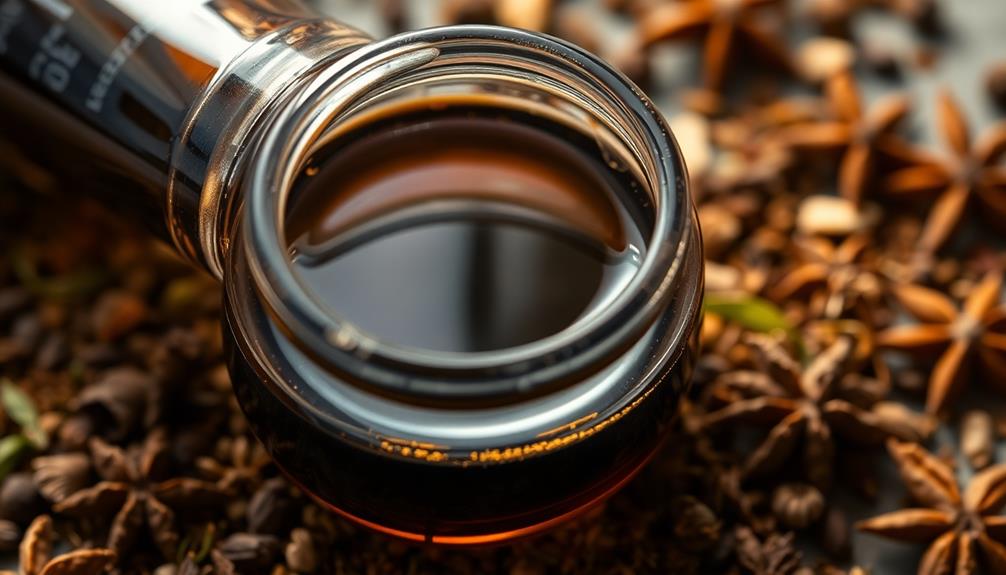Cancer itself doesn't have a particular smell, but it can change how you might smell! This happens because of special things called volatile organic compounds, or VOCs. Some types of cancer can alter body odors, and tumors can give off unusual scents, especially if they become infected. For example, some people might notice ammonia-like smells, especially during chemotherapy. It's important to talk to a doctor about any changes you smell, just in case. Isn't it fascinating how our bodies can signal something's wrong? Stick around, and you'll discover even more interesting facts about how cancer affects our senses!
Key Takeaways
- Cancer itself does not have a detectable smell, but it can release volatile organic compounds (VOCs) that alter body odor.
- Specific cancer types may produce distinct odors, such as ammonia-like smells from changes in body chemistry.
- Ulcerating tumors can emit foul odors due to necrotic tissue and bacterial growth.
- Chemotherapy can intensify odors in urine and sweat, often leading to noticeable changes.
- Trained dogs can detect subtle cancer-related smells in urine and breath samples with high accuracy.
Introduction

When you think about cancer, the idea of a specific smell might come to mind, but the reality is more complex.
Cancer doesn't give off a smell that humans can detect, but it does create tiny substances called volatile organic compounds, or VOCs. These VOCs can lead to changes in your body's odor. Some cancer types might even cause distinct smells, like a bad odor from an ulcerated tumor due to dying tissue or infections.
Did you know that dogs can actually detect these cancer-related odors? They're amazing at sniffing out changes in urine and breath samples, with a high success rate!
When someone is undergoing treatments like chemotherapy, their body odor can change too. This happens because treatments can lead to strong smells in urine and even bad breath, often due to side effects like dry mouth and vomiting.
While there's no one smell that tells you someone has cancer, any significant changes in body odor can be a sign to check in with a doctor. It's important to pay attention to these changes, especially if they come with other symptoms.
Description of the Smell

Cancer-related odors are influenced by various factors, including the type of cancer and the individual's body chemistry. When cancer occurs, it doesn't have a smell on its own, but the volatile organic compounds (VOCs) released by cancer cells can create specific body odors. Some people may notice an ammonia-like smell, which can be a sign of changes in their body chemistry before they even know they've cancer.
Ulcerating tumors can give off particularly unpleasant odors due to the necrotic tissue and bacterial growth. Chemotherapy and its side effects can also change the smell of bodily fluids, like urine and sweat, often making them stronger and more unusual.
However, not all cancer smells are bad!
Trained dogs can actually detect cancer smells that humans mightn't notice. This amazing ability shows how smells can help in finding and diagnosing cancer.
Source and Composition

The source of cancer-related odors primarily stems from volatile organic compounds (VOCs) produced by rapidly dividing cancer cells. These VOCs can create unique scent profiles that might catch your nose's attention. Some odors come from the byproducts of cancer cells, like polyamines, while ulcerating tumors can emit foul smells due to necrotic tissue and infections, which need medical care.
When someone undergoes chemotherapy, their body odors can change too. This means the scents from their sweat and urine might smell different than usual. Isn't it interesting how our bodies can change their smells based on what's happening inside?
Scientists are working hard to learn more about these odors. They're investigating how specific smells could help in developing new diagnostic methods. Imagine a world where doctors could detect cancer just by sniffing!
Scent detection is a fascinating field, and ongoing research aims to identify those special odor signatures tied to different types of cancer. By understanding these smells better, we might find new ways to help people feel better. It's a great reminder of how our bodies communicate, even through smell!
Typical Scenarios or Environments

Many environments where cancer patients receive treatment can carry distinctive odors that reflect the medical procedures and conditions present. When you step into a hospital or clinic, you might notice a mix of smells. Some of these come from the chemotherapy medications and body fluids used during treatment.
You may even catch a faint odor from cancer itself, especially in cases of ulcerated tumors. Patients often report a distinct ammonia-like smell or even a foul odor from swollen areas, like skin or breasts. This can be surprising, especially since the smell might linger despite regular washing.
It's interesting to know that cancer can produce volatile organic compounds, which contribute to these unique body odors. In some cases, the strong odors in urine and sweat become more noticeable, especially when patients are dehydrated.
Plus, did you know that trained dogs can sniff out specific cancer-related scents in breath and urine samples? This shows just how fascinating the world of cancer smells can be! So, when you're in a medical environment, remember that these smells tell stories about the treatments and experiences of patients.
Emotional or Cultural Associations

Unusual body odors can evoke strong emotional reactions and cultural associations, often leading to fear or misunderstanding. Many cultural beliefs connect certain smells with illnesses, including cancer. This can cause emotional responses that lead to stigmatization, making those affected feel ashamed.
You might notice that unusual body odors related to cancer can trigger feelings of anxiety or sadness, not just for patients but for their families, too.
When someone experiences these odors, it can feel isolating. You may want to hide away instead of joining in community activities, fearing judgment or misunderstanding. Just imagine how important it's for everyone to feel supported and understood!
Art and literature often use the metaphor of smell to show how society views disease, helping us understand emotional responses tied to identity. By talking about these odors openly, we can help create a community that promotes understanding, rather than fear.
It's all about showing kindness to one another and breaking down those walls of isolation. Together, we can make everyone feel accepted and loved, no matter what challenges they face!
Health or Safety Considerations

Understanding the emotional impact of unusual odors related to cancer can lead to important health and safety considerations.
It's essential to know that cancer itself doesn't have a specific smell, but certain body odors can change due to the illness. For example, some tumors might create foul odors because of infections or dead tissue, so seeking medical attention is vital.
During cancer treatment, especially chemotherapy, you might notice changes in your body odors, including bad breath. This can happen due to dry mouth or mouth sores, making good oral hygiene even more important. Brushing your teeth and staying hydrated can help you feel more comfortable!
Additionally, you may find that your sensitivity to odors increases during treatment. This sensitivity can affect your daily life, so it's helpful to communicate with your healthcare provider about any unusual odor changes you experience.
They can guide you and ensure you get the care you need. Remember, managing these changes is crucial for your well-being, and you don't have to face them alone!
Final Thoughts

How can we navigate the complex emotional landscape that accompanies the changes in body odor during cancer treatment?
It's important to remember that cancer itself doesn't have a detectable smell, but some odors can arise from treatment. For instance, chemotherapy can change how your body smells, making urine and sweat have strong, unpleasant odors. Dehydration and side effects can make this even more noticeable.
Some odors, like those from certain tumors, can come from necrotic tissue or infections. While these smells can be tough, they're signals for our bodies. If you notice unusual odors, especially with other symptoms, it's a good idea to talk to your doctor.
Interestingly, dogs have a special ability to detect cancer-related odors! They can sniff out specific types of cancer through breath or urine, showcasing just how sensitive our sense of smell can be.
Frequently Asked Questions
Does Cancer Have a Distinct Smell?
You might wonder if cancer has a distinct smell. While cancer itself doesn't emit a detectable scent, certain compounds produced by tumors can create specific odors that could indicate an underlying health issue. In fact, dogs and some specially trained animals have been known to detect cancers by scent, picking up on these subtle chemical changes. Similarly, researchers have discovered that certain diseases, including Parkinson’s, might also produce unique odors. For instance, some individuals with a hyper-sensitive sense of smell have reported distinguishing what Parkinson’s disease smells like, often describing it as a musky or greasy aroma.
What Does Cancer Discharge Smell Like?
When you experience cancer discharge, it might have a foul or sweet odor, possibly due to infections or metabolic changes. Maintaining hygiene and consulting your healthcare provider can help manage any unpleasant smells effectively.
Does Your Body Odor Change When You Have Cancer?
Yes, your body odor can change when you have cancer. You might notice unusual scents due to metabolic changes or treatments. It's essential to discuss any significant changes with your healthcare provider for proper guidance.
What Does Cancer Urine Smell Like?
When you notice changes in your urine's smell, it might be stronger or more unusual. This can happen due to cancer itself or treatments like chemotherapy, so staying hydrated and consulting your doctor's important.









